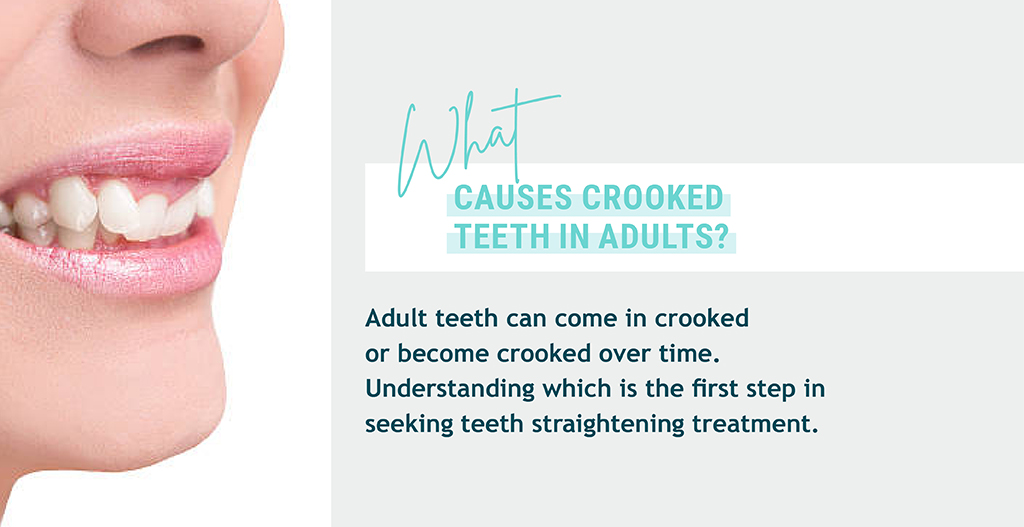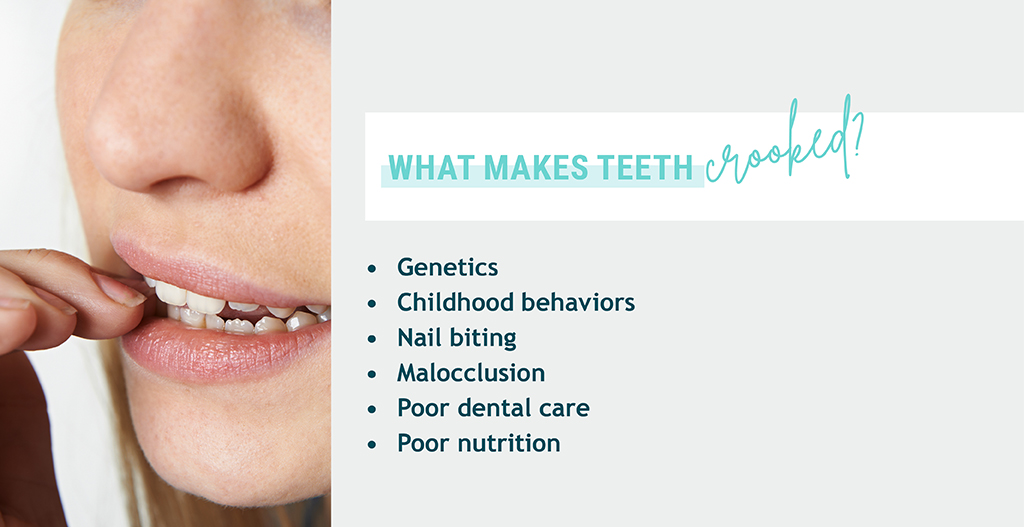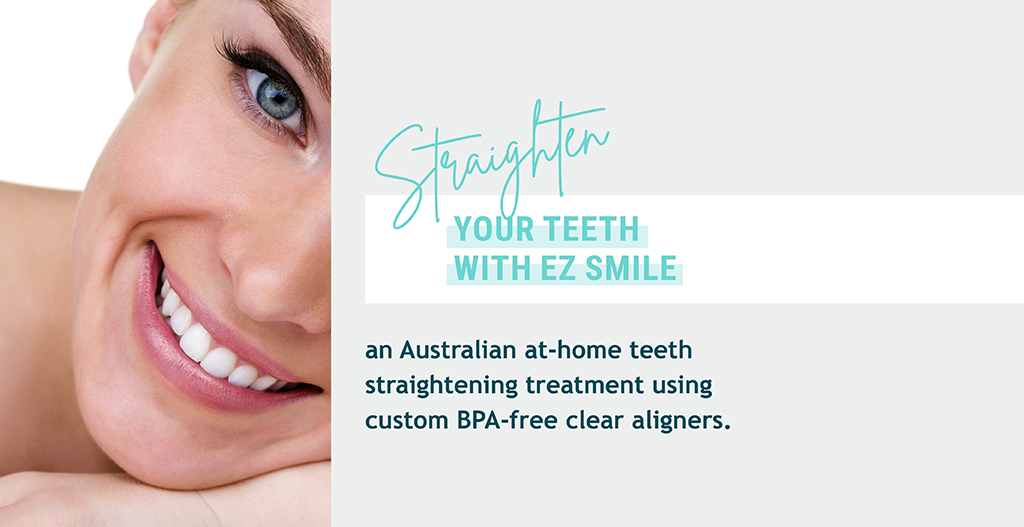It’s the age-old question – “why are my teeth not straight?” and while it’s not always a straightforward answer, there are a number of contributing factors that could be causing your misalignment. While you should never feel like you have to correct a misaligned bite, you might want to for a number of different reasons, and that’s okay!
Crooked or misaligned teeth are very common in both children and adults and is nothing to be embarrassed about. However, whether it’s for health or cosmetic reasons you may still be looking into options to correct or straighten your smile – that’s where we come in!
In this article we explore each of the possible causes of teeth misalignment including genetics, childhood behavior, nutrition and poor dental care, to name a few. We’ll also explore the problems associated with a crooked smile including periodontal disease, speech difficulties and digestion as well as your options for creating a straighter smile.
Why Are My Teeth Not Straight?
So, why are my teeth not straight? Maybe your teeth have always been misaligned, maybe it’s only recent or maybe you were meant to wear your retainer after a straightening treatment but never did causing your teeth to revert back to their crookedness – eek! Maybe it’s a completely different reason.
The point is, there’s a large number of reasons that may cause your teeth to be not-so-straight and figuring out which is true for you is the first step in getting a straighter smile. Do your parents also have misaligned teeth? If so, genetics may be causing a crooked smile for yourself.
Think about your childhood behavior; were you a thumb sucker? Thumb sucking in children is one of the leading causes for a crooked smile, especially in the front teeth. Even nail biting – yes, we’re all guilty of that too – can cause misalignment! Keep reading to find out more about the reasons that might be causing your pearly whites to be misaligned.
Is Teeth Alignment Hereditary?
So, is teeth alignment hereditary? When we experience any kind of medical or cosmetic abnormality, it’s only natural to look toward your family and genetics as the cause. We know that genetics create the foundation for a lot of who we are – our hair colour, risk of hereditary disease and even some personality traits – but can genetics also determine dental health?
The alignment of your teeth depends on several factors: the number and size of teeth, the size of your jaw, and how your teeth come together when you chew. These are indeed all genetic factors. However, a crooked smile is also caused by a number of environmental factors that fall outside of genetics, including sucking your thumb as a child or pushing your tongue against your teeth.
If you’re wondering “why are my teeth straight?”, it’s natural to consider your genetics. The short answer as to whether teeth alignment is hereditary is yes… but also no. While a large portion of oral health is linked to genetics, we can’t attribute every aspect of a misaligned smile to genetics. Bummer, right? So, when it comes to crooked teeth, you can only put some of the blame on your parents…
In the next few paragraphs, we’ll explore the factors associated with teeth misalignment that fall outside of genetics.

What Causes Crooked Teeth in Adults?
Have you ever wondered what causes crooked teeth in adults? We have!
Both baby teeth and permanent teeth can come in crooked, or they can become crooked. Understanding which is true in your case will help to decide the correct method of treatment.
While we can look to genetics for some causes of crooked teeth, a number of external factors also influence a misaligned bite. Most commonly, crooked or misaligned teeth in adults is often caused by external factors encountered in childhood.
Often, the real causes of misalignment in adults can be accredited to behaviors from their childhood. Allergies, asthma and an open mouth posture can also contribute to incorrect jaw development which can ultimately lead to crooked teeth.
Furthermore, diseases, injuries to the jaw, broken teeth and tooth extractions can also contribute to a misaligned bite. Whether your teeth came in crooked or have become crooked at some point, there are a large number of health benefits associated with having straight teeth.

What Makes Teeth Crooked?
Why are my teeth not straight? As we’ve mentioned, there are a number of different factors that may cause your teeth to be or become crooked at some point. Understanding what these factors are and how they apply to you is a great first step when considering your teeth straightening treatment options.
Common causes for crooked teeth include early loss of baby or adult teeth, improper fit of dental restorations, gingivitis, undue pressure on the teeth and gums, misalignment of the jaw after an injury, or other common oral health problems in children. Baby teeth sometimes move into crooked positions because they’re too small to fill the amount of gum space allocated to them. Prolonged habits, such as sucking on a thumb or pacifier may also cause teeth to push out or become crooked.
Here we explain what roles genetics, childhood behaviors, nail biting, malocclusion, poor dental care, poor nutrition and facial injury play in a misaligned bite.
Genetics
While we can’t attribute every aspect of a misaligned bite to genetics, we can attribute some. Crooked teeth are influenced by a combination of genes and environment.
Genetic factors that may cause crooked teeth include the number and size of teeth, the size of your jaw, how the teeth come together when you chew as well as the balancing forces between the tongue and lips.
While genetics play a role in your smile’s alignment, outside behaviors and factors also contribute significantly. So, while you can put some of the blame on your parents for your crooked teeth, your own behavior may also have caused a misaligned bite.
Childhood Behaviors
Many misalignment cases don’t stem from genetics, but instead are caused by childhood behaviors. When considering “why are my teeth not straight?”, think back to your childhood.
Thumb sucking, pacifier or bottle use, tongue thrusting and even tongue sucking are behaviours that may result in permanent crooked teeth if not corrected by the age of 6 or 7. Any of these habits can push the baby teeth forward, or possibly create an open-bite. There are usually no-ill effects from these kinds of childhood behaviors and most children naturally give up the habit between 2-4 years of age.
The first step to creating a straight smile is to take care of baby teeth from the get-go as they act as space maintainers for future permanent teeth. Taking good care of your baby teeth will help to prevent crowding in the adult teeth.
Nail Biting
You know that nervous habit so many of us have? Well, the bad news is that nail biting can actually cause crooked or misaligned teeth – eeek!
Chewing on your nails creates unnecessary stress to your teeth and can actually cause them to weaken and chip over time. In extreme cases, it can even move teeth resulting in a crooked smile.
Biting your nails with braces on is even worse as it adds pressure to individual teeth and can weaken the roots. Nail biting can also bend wires and knock braces off teeth causing them to move in the wrong direction.
If you’re still wondering “why are my teeth not straight?”, and you’re a chronic nail biter, we’d suggest curbing the habit as the best way to avoid any complications.
Malocclusion
A malocclusion is a misalignment or incorrect positioning of your teeth and can be present as crowding, crossbite, overbite, underbite or an open bite. While the types of issues vary, any kind of misalignment is important to address.
Typically, your teeth should fit nicely in your mouth with no crowding or spacing issues and your upper jaw teeth should also slightly overlap your lower jaw teeth.
As malocclusion largely stems from hereditary causes, it can be difficult to prevent. However, the good news is that early treatment in the form of braces, dental appliances, removal of teeth or surgery are generally very effective in correcting a misaligned bite caused by malocclusion.
Poor Dental Care
Poor dental care exposes you to a large number of problems that stem further than misalignment alone. However, in some cases poor dental care can actually cause crooked teeth. Gum disease and cavities that go untreated may need to be extracted which carries risk of the remaining teeth twisting or moving into the open space and ultimately causing misalignment.
Dental care is also very important when your teeth are already misaligned as having crooked or overlapping teeth makes it much more difficult to brush all surfaces of each tooth. Some patients opt to straighten their teeth primarily based on the improved dental care they will be able to experience once their teeth are straight.
Poor Nutrition
Similar to poor dental care, poor nutrition can lead to tooth decay and poor dental development which are both potential precursors to crooked teeth. In recent years, the World Health Organisation1 undertook an expedition in some less explored areas of the world and determined that less than 5% of ‘primitive’ families living there were experiencing diseases in their mouth and teeth.
On the other hand, our modern society is now riddled with dental diseases, with about 95% of the population experiencing some kind of dental problem.
Poor nutrition can cause serious structural changes on dental tissues, as such it’s important to nourish your body – and teeth – with the right foods. These include vegetables, fruit, cheese, yogurt and milk products.
Facial Injury
We hope you’ve never been in this situation, but if you have experienced facial injury before you’ll know that one nasty blow to the face can easily knock one or more teeth out of place.
If you’ve lost or removed one or more teeth, the remaining teeth will begin to shift into the empty area. Often this shifting causes twisting and general misalignment as the entire bite and overall smile is thrown off.
Crooked Teeth Problems
There’s a lot to discuss when it comes to crooked teeth problems. While some cases of misalignment are purely cosmetic, some cases of crooked teeth can affect your quality of life.
In some cases, misalignment may make basic dental hygiene more difficult as it is hard to brush all surfaces of teeth that are crooked. This ultimately leads to cavities and other dental issues.
In other cases, misalignment may cause the patient to feel so self-conscious that they no longer smile or try to avoid social situations all together.
Other crooked teeth problems caused by misalignment include periodontal disease, issues with chewing and digestion, excess wear and tear to teeth, speech difficulties and self-esteem issues.

Straighten Your Teeth with EZ SMILE
Now that we’ve broken down all of the potential answers to “why are my teeth not straight?”, it’s time to consider your options if you’d like to address your concerns. Whether it’s purely cosmetic, or if you’re experiencing any health issues related to your misaligned bite, there are plenty of teeth straightening options available. The benefits of a straight smile are much more than merely cosmetic and straight teeth often contribute to overall great dental health.
EZ SMILE is an Australian at-home teeth straightening model using custom BPA free clear aligners. Our clear aligners are practically invisible which means no one will even know you’re undergoing treatment!
EZ SMILE delivers clear aligners direct to you with results in an average of 6-8 months.
Simply order an impression kit or book in for a free 3D teeth scan, then we’ll create a customer 3D tooth straightening plan just for you. If you’re happy with the end result, you just need to go ahead and order your aligners – it’s that EZ!
Take our FREE 30 second assessment to find out if EZ SMILE is right for you.

